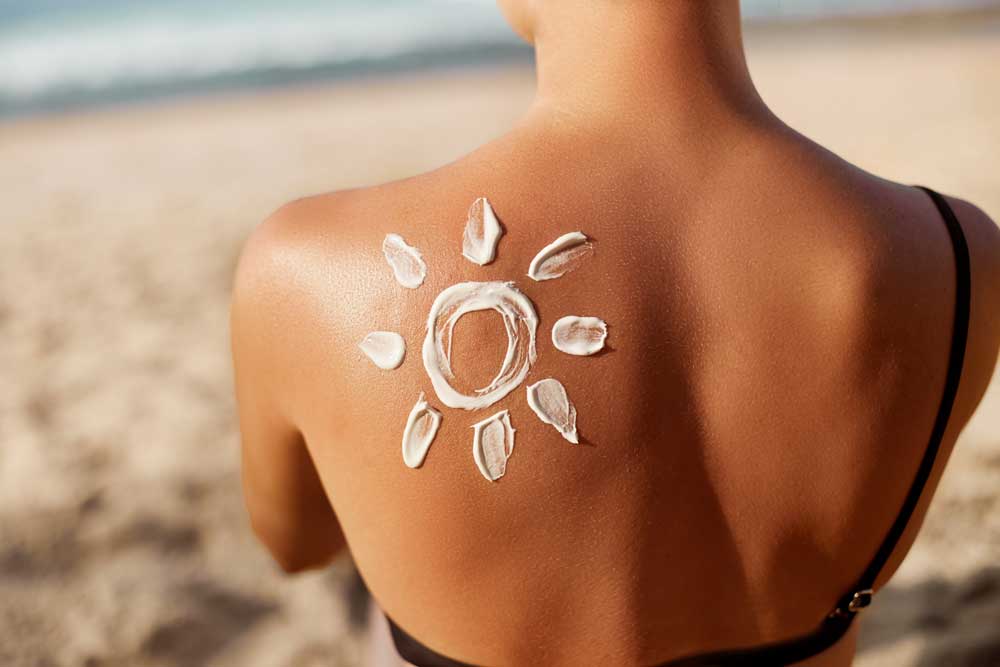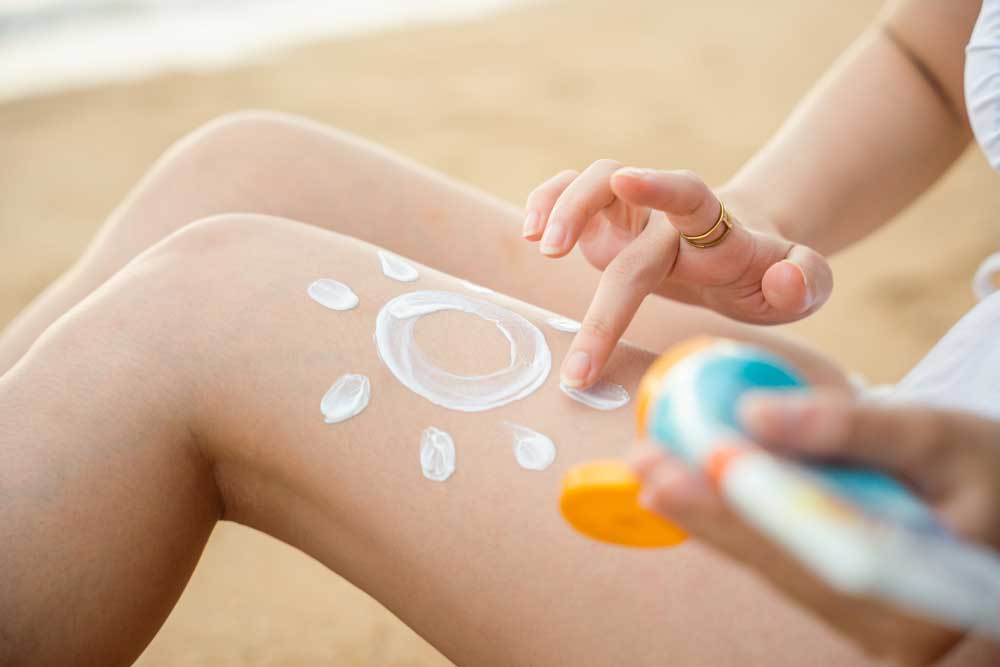Sunscreen is more than just a beauty product; it’s a critical component of your daily skincare routine. The importance of sunscreen lies in its ability to protect your skin from the harmful effects of ultraviolet (UV) radiation. Exposure to UV rays from the sun can lead to a myriad of skin issues, from short-term problems like sunburn to long-term concerns such as premature aging and skin cancer. By applying sunscreen regularly, you create a protective barrier that shields your skin from these detrimental effects, ensuring your skin remains healthy and youthful.
How Sunscreen Works Against Protecting Skin from UV Rays
Sunscreens function through two primary mechanisms: absorbing UV radiation and reflecting it away from the skin. These mechanisms are facilitated by different types of ingredients used in sunscreen formulations.
● Chemical Sunscreens: These sunscreens contain ingredients such as avobenzone, octocrylene, octinoxate, and homosalate. They work by absorbing UV radiation and converting it into heat, which is then released from the skin. This process helps prevent UV rays from penetrating the skin and causing damage.
● Physical (Mineral) Sunscreens: Physical sunscreens contain mineral ingredients like zinc oxide or titanium dioxide. They act as a physical barrier, reflecting and scattering UV radiation away from the skin. This type of sunscreen is often recommended for sensitive skin, as it is less likely to cause irritation.
Both types of sunscreens provide effective protection, but choosing the right type depends on your skin type and personal preferences. Regardless of the type you choose, the key is to ensure broad-spectrum protection, which means safeguarding against both UVA and UVB rays.
10 Surprising Sunscreen Benefits
1. Sunscreen Benefits: Protects Against Sunburn
Sunburn is an acute reaction to excessive UV exposure, leading to redness, pain, and peeling of the skin. Sunscreen is your first line of defense against sunburn. By applying sunscreen, you prevent UV rays from penetrating the skin and causing these painful effects. Sunscreen with a high SPF (Sun Protection Factor) is especially effective in reducing the likelihood of sunburn, allowing you to enjoy outdoor activities without the discomfort of sun-damaged skin.
2. Sunscreen Benefits: Supports Skin Barrier
The skin barrier plays a crucial role in maintaining skin hydration and protecting against environmental aggressors. UV exposure can compromise this barrier, leading to dryness, irritation, and increased vulnerability to infections. Sunscreen helps preserve the skin’s natural barrier by preventing UV radiation from weakening it. This protective effect ensures that the skin remains hydrated and resilient, reducing the risk of irritation and maintaining overall skin health.

3. Sunscreen Benefits: Helps Prevent Redness
UV radiation can trigger inflammatory responses in the skin, resulting in redness and irritation. Sunscreen helps mitigate these effects by blocking UV rays that cause such inflammatory reactions. By incorporating sunscreen into your daily routine, you can reduce the risk of redness and maintain a more even and calm complexion.
4. Sunscreen Benefits: Lowers Risk of Skin Cancer
One of the most compelling reasons to use sunscreen is its role in reducing the risk of skin cancer. UV radiation is a major contributor to various forms of skin cancer, including melanoma, basal cell carcinoma, and squamous cell carcinoma. Sunscreen protects the skin by blocking UV rays and preventing DNA damage that can lead to cancerous changes. Regular use of sunscreen is a proactive measure in safeguarding your skin health and reducing the likelihood of developing skin cancer.
5. Sunscreen Benefits: Lowers Risk of Premature Ageing
Premature aging of the skin, including wrinkles, fine lines, and sagging, is often caused by prolonged UV exposure. Sunscreen helps prevent these signs of aging by protecting the skin from UV rays that accelerate collagen and elastin breakdown. Collagen and elastin are essential proteins that maintain skin’s firmness and elasticity. By shielding your skin from UV damage, sunscreen helps preserve its youthful appearance and delays the visible effects of aging.
6. Sunscreen Benefits: Protects the Skin from Discolouration
UV rays can lead to various forms of skin discolouration, such as age spots, melasma, and uneven skin tone. These discolourations are often a result of increased melanin production triggered by UV exposure. Sunscreen helps prevent these issues by blocking UV rays that stimulate melanin production. Regular application of sunscreen maintains a more uniform skin tone and reduces the appearance of dark spots, contributing to a clearer and more radiant complexion.
7. Sunscreen Benefits: Protects Skin Antioxidant Defense System
The skin contains natural antioxidants that help combat oxidative stress caused by environmental factors, including UV radiation. UV exposure can deplete these antioxidants, leading to oxidative damage and skin aging. Sunscreen helps preserve the skin’s antioxidant defense system by preventing UV-induced damage. By protecting these natural defenses, sunscreen supports overall skin health and reduces the risk of oxidative stress.
8. Sunscreen Benefits: Reduces Risk of Hyperpigmentation
Hyperpigmentation, characterized by dark spots and uneven skin tone, can be exacerbated by UV exposure. Sunscreen plays a vital role in preventing hyperpigmentation by blocking UV rays that stimulate excessive melanin production. By incorporating sunscreen into your daily skincare routine, you can reduce the risk of developing dark spots and maintain a more even and radiant complexion.
9. Sunscreen Benefits: Enhances Post-Sun Exposure Recovery
After sun exposure, the skin is more vulnerable to damage and inflammation. Sunscreen not only protects the skin during sun exposure but also helps enhance the recovery process afterward. By reducing UV-induced damage, sunscreen aids in faster healing and recovery of the skin, minimising the risk of long-term damage and irritation.
10. Sunscreen Benefits: Promotes Overall Skin Health
Regular use of sunscreen contributes to overall skin health by preventing a range of skin issues associated with UV exposure. From reducing the risk of skin cancer and premature aging to maintaining a uniform skin tone and preserving natural antioxidants, sunscreen supports a comprehensive approach to skincare. Incorporating sunscreen into your daily routine ensures that your skin remains healthy, protected, and radiant.
How to Apply Sunscreen the Right Way
Proper application of sunscreen is essential to maximize its effectiveness. Follow these steps to ensure you get the most out of your sunscreen:
1. Choose the Right SPF: Select a sunscreen with a SPF of at least 30. Higher SPF values provide greater protection, but even SPF 30 is effective for most people.
2. Apply Generously: Use about a nickel-sized amount of sunscreen for your face and a shot glass worth for your body. Ensure you cover all exposed areas evenly.
3. Apply Before Sun Exposure: Apply sunscreen 15-30 minutes before going outside. This allows the sunscreen to absorb properly and form an effective barrier.
4. Reapply Regularly: Sunscreen should be reapplied every two hours, or more frequently if you are swimming, sweating, or towel-drying.
5. Don’t Forget Commonly Missed Areas: Be sure to apply sunscreen to areas like your ears, neck, and the back of your hands. These areas are often exposed and can easily be overlooked.
6. Use Sunscreen Year-Round: UV rays can cause skin damage regardless of the season. Make sunscreen a daily habit, even on cloudy days or during winter months.

How to Choose the Right Sunscreen for Different Skin Types
Selecting the right sunscreen involves considering your skin type and specific concerns:
● Oily or Acne-Prone Skin: For oily or acne-prone skin, choose oil-free or non-comedogenic sunscreens. Gel-based or matte-finish formulas are ideal as they help control shine and won’t clog pores.
● Dry Skin: If you have dry skin, look for sunscreens with hydrating ingredients such as hyaluronic acid, glycerin, or ceramides. Cream-based sunscreens provide extra moisture and help keep your skin hydrated.
● Sensitive Skin: Sensitive skin requires gentle products to avoid irritation. Opt for mineral sunscreens containing zinc oxide or titanium dioxide. These ingredients are less likely to cause sensitivity and are suitable for delicate skin.
● Normal Skin: For normal skin, a broad-spectrum sunscreen with SPF 30 or higher is generally sufficient. Choose a formulation that suits your preference, whether it’s a lotion, cream, or spray.
Conclusion
Incorporating sunscreen into your daily skincare routine offers a multitude of benefits that go beyond just preventing sunburn. From protecting against skin cancer and premature aging to maintaining a healthy skin barrier and reducing discolouration, sunscreen is a powerful tool in preserving and enhancing your skin’s health. By understanding how to apply sunscreen correctly and choosing the right type for your skin, you can enjoy these benefits and keep your skin protected and youthful for years to come. Make sunscreen a non-negotiable part of your daily regimen and experience the transformative effects it has on your skin’s health and appearance.
FAQs
How often should I apply sunscreen?
Apply sunscreen every two hours, or more frequently if you are swimming or sweating. Always reapply after towel drying.
Can I use sunscreen if I have sensitive skin?
Yes, opt for mineral sunscreens with zinc oxide or titanium dioxide, which are generally gentler on sensitive skin.
Do I need sunscreen on cloudy days?
Yes, UV rays can penetrate through clouds. It’s important to apply sunscreen daily, regardless of the weather.
Is sunscreen necessary in winter?
Absolutely. UV rays can still damage your skin in winter, especially at higher altitudes or if you’re exposed to reflective surfaces like snow.
Can I use sunscreen on my face and body?
Yes, sunscreen should be applied to all exposed skin, including both face and body.